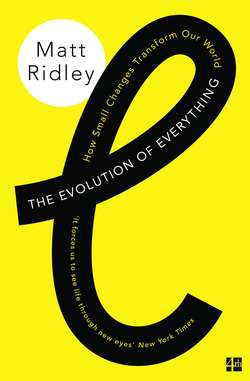Читать книгу The Evolution of Everything: How Small Changes Transform Our World - Matt Ridley, Matt Ridley - Страница 19
3 The Evolution of Life
ОглавлениеA mistake I strongly urge you to avoid for all you’re worth,
An error in this matter you should give the widest berth:
Namely don’t imagine that the bright lights of your eyes
Were purpose made so we could look ahead, or that our thighs
And calves were hinged together at the joints and set on feet
So we could walk with lengthy stride, or that forearms fit neat
To brawny upper arms, and are equipped on right and left
With helping hands, solely that we be dexterous and deft
At undertaking all the things we need to do to live,
This rationale and all the others like it people give,
Jumbles effect and cause, and puts the cart before the horse …
Lucretius, De Rerum Natura, Book 4, lines 823–33
Charles Darwin did not grow up in an intellectual vacuum. It is no accident that alongside his scientific apprenticeship he had a deep inculcation in the philosophy of the Enlightenment. Emergent ideas were all around him. He read his grandfather’s Lucretius-emulating poems. ‘My studies consist in Locke and Adam Smith,’ he wrote from Cambridge, citing two of the most bottom–up philosophers. Probably it was Smith’s The Moral Sentiments that he read, since it was more popular in universities than The Wealth of Nations. Indeed, one of the books that Darwin read in the autumn of 1838 after returning from the voyage of the Beagle and when about to crystallise the idea of natural selection was Dugald Stewart’s biography of Adam Smith, from which he got the idea of competition and emergent order. The same month he read, or reread, the political economist Robert Malthus’s essay on population, and was struck by the notion of a struggle for existence in which some thrived and others did not, an idea which helped trigger the insight of natural selection. He was friendly at the time with Harriet Martineau, a firebrand radical who campaigned for the abolition of slavery and also for the ‘marvellous’ free-market ideas of Adam Smith. She was a close confidante of Malthus. Through his mother’s (and future wife’s) family, the Wedgwoods, Darwin moved in a circle of radicalism, trade and religious dissent, meeting people like the free-market MP and thinker James Mackintosh. The evolutionary biologist Stephen Jay Gould once went so far as to argue that natural selection ‘should be viewed as an extended analogy … to the laissez-faire economics of Adam Smith’. In both cases, Gould argued, balance and order emerged from the actions of individuals, not from external or divine control. As a Marxist, Gould surprisingly approved of this philosophy – for biology, but not for economics: ‘It is ironic that Adam Smith’s system of laissez faire does not work in his own domain of economics, for it leads to oligopoly and revolution.’
In short, Charles Darwin’s ideas evolved, themselves, from ideas of emergent order in human society that were flourishing in early-nineteenth-century Britain. The general theory of evolution came before the special theory. All the same, Darwin faced a formidable obstacle in getting people to see undirected order in nature. That obstacle was the argument from design as set out, most ably, by William Paley.
In the last book that he published, in 1802, the theologian William Paley set out the argument for biological design based upon purpose. In one of the finest statements of design logic, from an indubitably fine mind, he imagined stubbing his toe against a rock while crossing a heath, then imagined his reaction if instead his toe had encountered a watch. Picking up the watch, he would conclude that it was man-made: ‘There must have existed, at some time, and at some place or other, an artificer or artificers, who formed [the watch] for the purpose which we find it actually to answer; who comprehended its construction, and designed its use.’ If a watch implies a watchmaker, then how could the exquisite purposefulness of an animal not imply an animal-maker? ‘Every indication of contrivance, every manifestation of design, which existed in the watch, exists in the works of nature; with the difference, on the side of nature, of being greater or more, and that in a degree which exceeds all computation.’
Paley’s argument from design was not new. It was Newton’s logic applied to biology. Indeed, it was a version of one of the five arguments for the existence of God advanced by Thomas Aquinas six hundred years before: ‘Whatever lacks intelligence cannot move towards an end, unless it be directed by some being endowed with knowledge and intelligence.’ And in 1690 the high priest of common sense himself, John Locke, had effectively restated the same idea as if it were so rational that nobody could deny it. Locke found it ‘as impossible to conceive that ever bare incogitative Matter should produce a thinking, intelligent being, as that nothing should produce Matter’. Mind came first, not matter. As Dan Dennett has pointed out, Locke gave an empirical, secular, almost mathematical stamp of approval to the idea that God was the designer.
